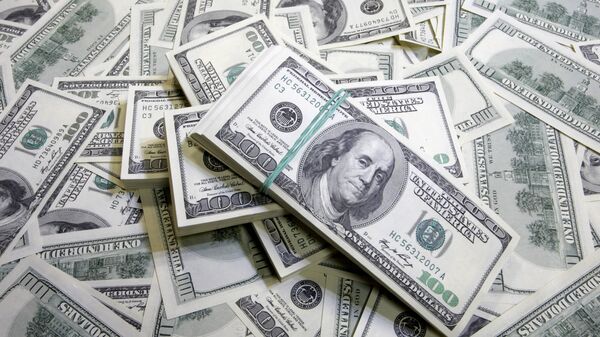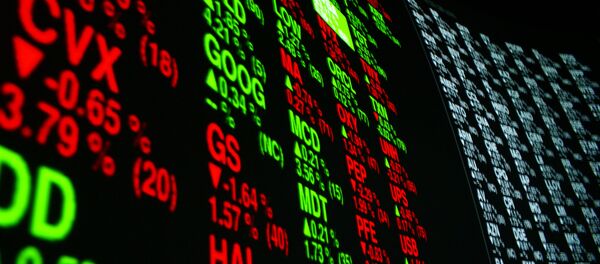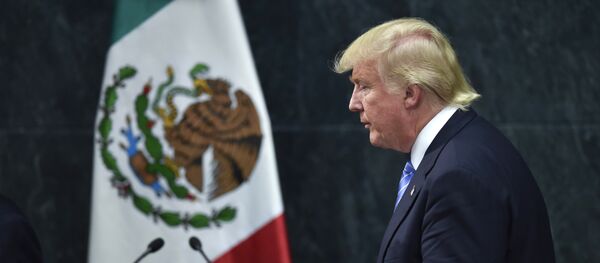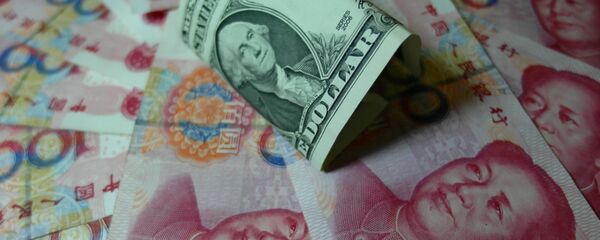Speaking to the Wall Street Journal on Monday, the President-elect said that US companies simply could not compete with China because the dollar was too strong. "And it's killing us," Trump added. The comments mark a sharp contrast to US policy going back to the mid-1990s, when first the Treasury and then a succession of presidents from Bill Clinton to George W. Bush to Barack Obama spoke in favor of a strong dollar.
Speaking to Radio Sputnik, Robert Sinche, chief global strategist at the US-based brokerage firm Amherst Pierpont Securities, laid out the origins of the 'strong dollar' policy, and explained why perhaps it really is time for the policy, whose current effectiveness remains unclear anyway, to be done away with.
"The so-called strong dollar policy has its origins back in the mid-1990s," the analyst recalled, "particularly when the dollar/[Japanese yen exchange rate] collapsed to under 80 [yen per dollar] and Treasury Secretary Robert Rubin at the time indicated that he thought a strong dollar was in the US interest."
Since then, Sinche noted, "once that 'strong dollar' policy was put in place, it's been very difficult to undo it. Treasury secretaries for the last twenty years now have come through and reiterated the policy, just because it was something to say." In fact, the market expert suggested that since the 1990s, it hasn't been clear what exactly US monetary authorities have actually been doing to support a strong US currency.
"It's not clear to me, except perhaps in the mid-1990s, when the dollar was very weak and very volatile, that in fact the strong dollar policy has really been a policy, and whether it really meant anything; in other words: was there a particular target level for the dollar? Did the Federal Reserve change monetary policy to adjust the dollar? I think the answer to those questions is 'no'," the analyst said.
Accordingly, the analyst noted, "in that context it's probably time for it to go anyway. It hasn't really been doing anything; I think it's outlived its usefulness and in that context I don't think it's terribly upsetting if we lose that rhetoric."
As far as Trump's comments, and the feasibility of deliberately reducing the value of the dollar are concerned, Sinche argued that "the analysis suggests that many countries can adjust to different levels of the exchange rate; the question becomes how quick the adjustment is."
"I think there is some concern about the speed with which the dollar has increased, particularly since the election. But I think in general the President-elect's comments were really focused on China, not the dollar. And I think there has been a case [to make] for many, many years now that China has been intervening heavily in their currency. That's how their reserves grew by trillions of dollars, and then fell by a trillion dollars. When a country's foreign exchange reserves go up and down that much, it's a pretty clear indication that they're intervening in the markets, attempting to adjust their currency levels. I think the comments by the President-elect really express some concerns that the dollar has been going up in general, but particularly going back up against the Chinese currency."
"The administration is going to focus on some of the trade agreements that have been signed in the past and find out what's appropriate and what's not appropriate in those agreements," the expert noted.
As for Trump's financial team, the analyst said he is hopeful that "down deep, most of the advisers in the administration are in favor of free and open markets."
At the same time, he added that "the US dollar continues to hold a very special place in the world," and remains the currency of choice for other countries to hold their foreign exchange reserves in. "Even China, by most estimates, is still holding probably close to two thirds of its foreign exchange reserves in US dollars."
However, it remains unclear how the country's massive sovereign debt of over $19.5 trillion, or other factors, are going to affect the dollar's status in the future, if at all.
"The US dollar does benefit from a special status in the world," Sinche noted. "I think the US will continue to keep that status for the dollar; I think unfortunately we're probably going to get a little bit of jawboning about the value of the dollar in markets, but I think that's going to take second place to some of these other reviews of trade agreements, and how trade relationships are structured around the world," the analyst concluded.







